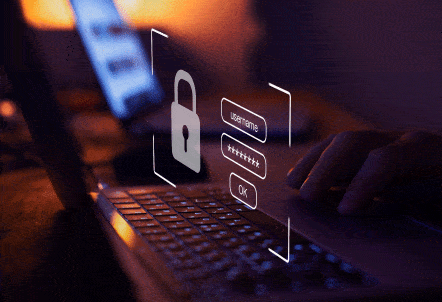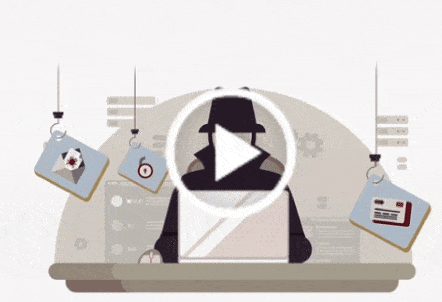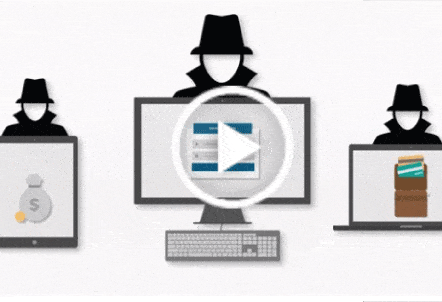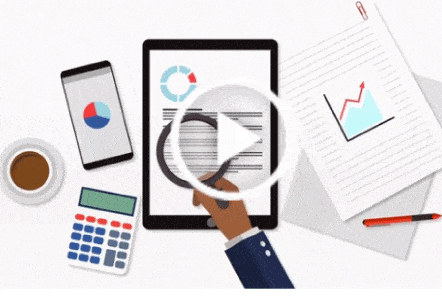
Fraud Prevention Resource Center
Protect Yourself Against Fraud by Staying Educated
Welcome to our Fraud Prevention Resource Center
We are committed to protecting your financial well-being from fraud. Understanding your vulnerabilities and how fraud occurs is the first step in safeguarding your financial future. We’re here to empower you with the necessary tools and knowledge to defend your identity and maintain the security of your hard-earned money.
It’s important to know that United Teletech Financial Federal Credit Union will never ask you for confidential information, such as your full social security number, your bank account number, debit or credit card numbers, CVV or PIN in an email or via a website, online chat or from an unsolicited visit or phone call. You can stop a scammer just by not giving them the info they want.
Be Proactive! Protect Your Account with Card Controls & Alerts
Log into your online banking to access card controls and alerts. Card controls allow you to set up debit and transaction alerts, and to freeze your card if ever needed. You can receive these alerts via email or text or both. Take your first step to protecting your accounts today.
Fraud Tips
-

The Different Types of Identity Theft Around the World
Identity theft is one of the most challenging things anyone can experience. You can lose control of your money, people’s faith in you, and sometimes even your physical property like your home or vehicle.
-

7 Ways to Manage Your Digital Footprint
Search yourself online. Many public record sites list former addresses, phone numbers, and other identifying information that thieves can piece together when trying to steel your identity.
-

Would you fall for these common scams?
Take our quiz to find out if you’re susceptible to fraud and common scams. Keep track of the letters you choose for each question to see your outcome.
-

Beware: Identity Theft Scams On Your Cell Phone
Anyone who has spent time researching or reading about identity theft is most likely aware of some common scams—phishing, shoulder surfing, fake Craigslist ads—that we are susceptible to as online consumers.
-

Key Strategies to Prevent Online Credit Card Fraud and Scams
Credit card scams and credit card fraud are terms used to describe any form of theft or fraud that uses a credit card or similar payment mechanism to gather a fraudulent source of funds.
-

Scam Proof Your Life: What to Do When You've Been Hacked
Everyone wants to take steps to ensure that thieves don’t get a hold of their identities. There are a variety of products on the market that claim to help keep your identity secure, and many of them do work and can help.
Videos
-

Beware: Identity Theft Scams On Your Cell Phone
Despite ongoing improvements in security, identity theft continues to be one of the most common crimes in America. In this video, we’ll explore steps to protect yourself.
-

Rehabilitative Actions for Fraud or Identity Theft
In the unfortunate case that you have your identity stolen, there are several rehabilitative steps that you’re going to need to take. In this video, we’ll cover the actions you can take to recover and minimize any financial damage to you as the victim.
-

Protecting Your Identity
Protecting yourself against identity theft is kind of like a puzzle. It requires time and a lot of different pieces. In this video, we’ll discuss the various pieces so that you can make sure you’re covered.
Frequently Asked Questions
Fraud is a term used to describe deceitful practices or dishonest acts carried out with the intention of gaining something valuable, usually money or property, at someone else’s expense. It involves a misrepresentation or concealment of the truth in order to deceive or mislead another person.
Some common types of Fraud include:
Identity Theft: This occurs when someone steals personal information such as Social Security numbers, account information, or credit card numbers to impersonate another individual, usually for financial gain.
Financial Fraud: This can include credit card fraud, insurance fraud, securities fraud, mortgage fraud, and more. These types of fraud often involve manipulating financial documents or using deceptive practices to gain money or assets.
Internet and Cyber Fraud: This encompasses various schemes like phishing, where fraudsters attempt to obtain sensitive information by posing as a trustworthy entity through electronic communication.
There are several ways to protect yourself from identity theft, including safeguarding personal information, using secure internet connections, creating strong passwords, using two-factor authentication, and regularly monitoring your credit reports and financial accounts for unusual activity.
- Consistently check your account activity by viewing your statements or your account history on online / mobile banking. Report any suspected fraudulent transactions to your credit union.
- Opt for e-statements for as many account statements as possible to keep your mail safe.
- Keep your contact information up to date with the credit union so we can contact you if we suspect fraud.
- Shred credit card offers, receipts and other documents that may connect your name and account numbers.
- Keep your credit / debit cards in a safe location. If they go missing, contact the credit union immediately to prevent further usage.
- Use strong passwords to deter access to your account by others.
- Use two-factor authentication whenever possible.
- Enable alerts on online / mobile banking.
- Keep your computer software up to date to protect against hackers.
- Safely store checks and account statements or go paperless.
- Keep sensitive information like PINs, social security numbers and account numbers in a safe location
Every Checking account is equipped with a Mastercard debit card that includes card alerts, enabling you to monitor all types of transactions.
For example, you can set up alerts to notify you if a transaction exceeds a certain limit, if it is an online transaction, and/or if it is an international transaction. These settings are accessible to you in the Card Controls section of online banking. Here, you can select the alert type and choose your preferred method of notification, such as email and/or text message.
If you ever misplace your card, there’s an “off” feature that lets you temporarily halt any transactions on the card. When you locate the card again, simply log back in to reactivate it, and it’ll be ready for purchases. If the card remains lost or is stolen, please report it immediately by calling us at 866-213-2398.
Identity thieves can acquire your information through various methods, including phishing scams, data breaches, mail theft, or through information you share on the internet. They might also use more traditional methods like dumpster diving to retrieve discarded documents containing personal information.
- Be cautious if you’re asked to provide personal or account information like an account number, verification code, or PIN.
- If you’re asked to make payments in an unconventional way, such as through gift cards, bitcoin, prepaid debit cards, digital currency, or Zelle® to resolve a fraud issue, be suspicious.
- Don’t let yourself be pressured into immediate action based on a phone call, email, or text that attempts to manipulate you.
- Be cautious if you’re unexpectedly contacted via phone, email, text with a request for personal information or money. Do not click on a link or download an attachment from an unknown source.
- if you’re offered something free or a ‘get rich quick’ opportunity that seems too good to be true, it likely is.
- Never cash a check for a stranger.
If you suspect you’re a victim of identity theft, you should immediately report it to your financial institution and the police. You should also alert the three major credit bureaus – Equifax, Experian, and TransUnion – to place a fraud alert on your credit report.
- Contact the credit union immediately so we can put a freeze on your card to prevent further fraudulent activity.
- Alert the Credit Bureaus: Contact the three major credit bureaus—Experian, Equifax, and TransUnion—to report the theft and ask them to place a fraud alert on your credit reports. This makes it harder for thieves to open more accounts in your name. You can also consider freezing your credit reports, which prevents new creditors from accessing your report without your permission.
- Report to the FTC: File a complaint with the Federal Trade Commission (FTC) online at IdentityTheft.gov or by phone at 1-877-ID-THEFT (1-877-438-4338). The FTC will provide a recovery plan and help you track your progress.
- File a Police Report: Filing a report with your local police department provides official documentation that can support your case with creditors and credit bureaus.
- Monitor Your Accounts and Credit Reports: Regularly review your financial accounts and billing statements for charges you don’t recognize. Also, take advantage of free annual credit reports to check for any irregularities or unauthorized accounts.
- Change Passwords and PINs: Update passwords and PINs for your online accounts, especially for your financial accounts.
The recovery process can vary depending on the complexity of the case. It can take anywhere from a few weeks to several months or even years to fully recover.
Fraud can significantly affect your credit score if it results in fraudulent accounts or charges, which lead to unpaid debts recorded on your credit history.
Fraudulent scams come in many forms, but some of the most common ones include:
Phishing Scams:
These scams typically involve emails or text messages that appear to be from legitimate businesses or financial institutions. The messages attempt to trick recipients into clicking on a link or opening an attachment that installs malware or leads to a fraudulent website where they’re asked to provide personal information.
Vishing Scams:
These scams involve phone calls where the scammer pretends to be from a trusted organization, such as your credit union or utility company, and tries to trick you into providing personal or financial information.
Tax Identity Theft:
This happens when someone uses your Social Security number to file a fraudulent tax return in your name to claim a refund.
Medical Identity Theft:
This occurs when someone uses your personal information to obtain medical services or file fraudulent claims with your health insurance provider.
Credit Card Skimming:
Scammers use devices called skimmers attached to ATMs, gas pumps, or other public payment terminals to steal credit or debit card information.
Tech Support Scam:
This is a form of fraud where scammers pose as representatives of reputable technology or software companies. The scammer contacts potential victims, typically via phone calls, emails, pop-up messages, or even websites, claiming that they’ve detected viruses, malware, or other security issues on the victim’s computer.
Data Breaches:
Hackers target businesses to steal customer data. If your information is included in a data breach, it can be used for various types of identity theft.
Romance Scams:
These scams occur on dating sites or social networks, where scammers create fake profiles to build relationships with victims. They then trick the victim into sharing personal information or sending money.
Social Media Scams:
Scammers can use information you share on social media to answer security questions on your accounts and gain access to your personal and financial information.
Mail Fraud:
This traditional method involves stealing mail directly from your mailbox to obtain credit card statements, tax information, or other documents containing personal information.
Remember, awareness and vigilance are the best defenses against identity theft scams. Always be wary of unsolicited communications asking for personal information and take steps to protect your data online and offline.
Have a question? We are here to help.
If you have more questions about reporting or preventing fraud on your account, our Member Care team is happy to help you. Fill out our quick contact form here or stop by one of our convenient branch locations. You can also call us at (732) 530-8100 ext. 2530.
